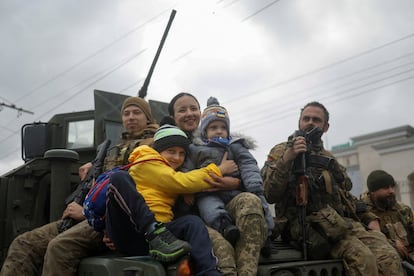Non-profit groups hand ICC information on 20,000 Ukrainian children deported to Russia
Kyiv has documented the deportation of thousands of minors who are stripped of their identity and nationality and handed over to Russian families


Ukraine has documented the deportation of nearly 20,000 minors to Russia since the start of the military invasion in February 2022. The war has also resulted in the disappearance of 2,008 children, the deaths of 551, and injuries to another 1,388; a total of 388 have been repatriated, according to official data. The forcible transfer of citizens from their country during an armed conflict can constitute a war crime under international law. This is a particularly sensitive issue that Kyiv has repeatedly denounced and has been trying to document since the beginning of the war.
The search involves an added complication for the Ukrainian authorities. This group of deportees is stripped of its identity and time is working against their return and reintegration into the society from which they were forcibly taken. As they lack documents and live under different names, DNA testing will be essential for these children to be reunited with their families. Russian authorities have even boasted about a “de-Ukrainization” process.
The numbers of deported minors are listed on the digital portal opened for this purpose by the Ukrainian government, which adds the cases of 15 children who have been sexually abused. “The Russian authorities take away the children’s nationality and change their names and surnames. They are then adopted or placed in shelters and prevented from returning to their homeland,” said Oleksandr Karasevych, Ukrainian ambassador to the Netherlands, on Wednesday during a symposium organized by the International Commission on Missing Persons (ICMP), a non-profit group based in The Hague and established in 1996 at the request of former U.S. president Bill Clinton.
During the session, specific cases were highlighted such as that of a Ukrainian boy who was deported at age 16 and ended up with a Russian foster family. “Wanted by his mother, he is one of the first who managed to escape and his Russian family is still claiming him,” according to Kateryna Rashevska, a legal expert with the Ukrainian Regional Center for Human Rights civic platform. “Once in Russia, deported children are not only indoctrinated or militarized: the destruction of their personal data makes it difficult for them to be found on Russian soil, in Belarus, and Ossetia, as well as occupied areas of Ukraine, which is where they can be taken.”
Rashevska described the situation as a “war crime” and “torture or inhumane treatment,” and her organization has sent information to the International Criminal Court (ICC). During the meeting Wednesday, Ukrainian police indicated that the deportations have been carried out in two ways: either by taking the children away from their families and forcibly transporting them to Russian territory, or by taking them out of Ukrainian institutions such as orphanages in the areas under the Kremlin’s control.
In the second case, locating them is even more difficult. Although the Russian government claims to have protected them by removing them from the war zone, President Vladimir Putin has been subject to an ICC arrest warrant since March 2023 for his alleged responsibility in the forced removal of the Ukrainian minors. The court is also searching for Maria Lvova-Belova, the Kremlin’s commissioner for children’s rights. Russia is not a member of the ICC and does not recognize its jurisdiction.
Mariam Lambert, director of the Netherlands-based Orphans Feeding Foundation, which today focuses on repatriating Ukrainian minors deported to Russia, contradicts the Kremlin’s official discourse. In her opinion, the deportations “were prepared before the invasion.” “The lists we have sent to the European Union include Russian lawyers, doctors, nurses, teachers, and policemen who are involved. This is not an isolated incident.”
Mykola Kuleba, Ukraine’s former commissioner on children’s rights, has gone even further. He has said that, in Belarus, “the Red Cross was involved in the deportation of these children, something the head of the organization itself has acknowledged.” Through his investigations, Kuleba has found that the deported minors “are afraid to try to get out of their situation lest they or their families be killed, and time passes.”
The identification and reintegration of children who have managed to return are the other two problems faced by the authorities. Without valid documents, DNA testing is essential to trace their families. On this point, Liz Barnert, a Cuban-American pediatrician, stresses the importance of the right to identity in a context of forced separation, and the psychological effectiveness of this type of genetic analysis. “DNA does not lie and reunions can take place that otherwise would never have happened,” she says.
Co-founder of DNA Bridge, a consortium dedicated to the reunification of migrant families, Barnert has proposed “a comprehensive protocol for searching for missing persons.” Serhii Krymchuk, director of the State Scientific Research Forensic Center of the Ukrainian Ministry of Internal Affairs, noted that they have a state digital DNA register and “48,964 families have provided their fingerprints, of which 6,967 are children’s samples.” Ukraine has also set up a coordination council to work to achieve the return and reintegration of all children deported in the shadow of the war.
Sign up for our weekly newsletter to get more English-language news coverage from EL PAÍS USA Edition
Tu suscripción se está usando en otro dispositivo
¿Quieres añadir otro usuario a tu suscripción?
Si continúas leyendo en este dispositivo, no se podrá leer en el otro.
FlechaTu suscripción se está usando en otro dispositivo y solo puedes acceder a EL PAÍS desde un dispositivo a la vez.
Si quieres compartir tu cuenta, cambia tu suscripción a la modalidad Premium, así podrás añadir otro usuario. Cada uno accederá con su propia cuenta de email, lo que os permitirá personalizar vuestra experiencia en EL PAÍS.
¿Tienes una suscripción de empresa? Accede aquí para contratar más cuentas.
En el caso de no saber quién está usando tu cuenta, te recomendamos cambiar tu contraseña aquí.
Si decides continuar compartiendo tu cuenta, este mensaje se mostrará en tu dispositivo y en el de la otra persona que está usando tu cuenta de forma indefinida, afectando a tu experiencia de lectura. Puedes consultar aquí los términos y condiciones de la suscripción digital.








































